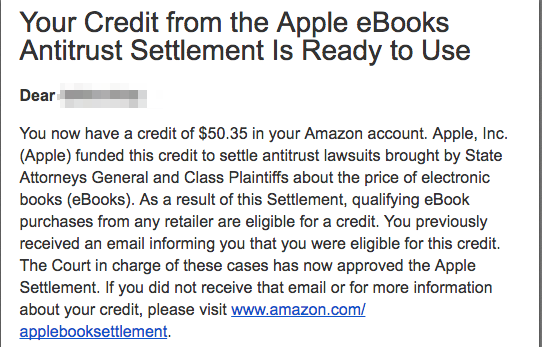Amazon is giving you free money courtesy of Apple — but only if you bought an e-book from a major publisher between between April 2010 and May 21, 2012. And you get more if you bought a best-seller.
The e-commerce giant sent notifications to users on Tuesday, telling them their Apple money is ready to be spent.
When your Amazon credit from the Apple eBooks Antitrust Settlement is ready to use
Apple and the major book publishers lost an antitrust case in 2012 after the Justice Department sued the companies over what the Department of Justice said was collusion in setting the price of e-books.
When Amazon launched the Kindle in 2007, kicking off the e-book market for real, it set the price at $9.99 per title. That was roughly the price at which publishers sold them to retailers, meaning there was barely any profit involved. That didn't sit well with Steve Jobs: When Apple came out with the iPad, it worked with publishers to set the price for e-books at $12.99 or $14.99, with a 30% cut for Apple. The DOJ said it was price-fixing.
Steve Jobs pitched the higher prices to publishers with a warning: If they didn't embrace Apple's bookstore, and its approach to pricing, "you will likely be sitting on the sidelines of the mainstream e-book revolution," according to an email revealed in court documents.
He was wrong, and now you get paid.

Some publishers quickly settled the charges without going to court, but Apple fought it all the way to the end, and lost. In compensation for the higher prices pushed on the market, Amazon's e-book customers got settlement money from the publishers in March 2014, but it's only now that the Apple cash has begun to flow.
In a now-notorious email to Rupert Murdoch's son James, Steve Jobs said publishers had told him Amazon's $9.99 e-book pricing was "eroding the value
perception of their products in customer’s minds, and they do not want this practice to continue" for newly released books. "The current situation is not sustainable and not a strong foundation upon which to build an e-book business," Jobs said.
In another email, he made the pitch even clearer. "Throw in with Apple and see if we can all make a go of this to create a real mainstream e-books market at $12.99 and $14.99."
The other alternatives, Jobs said, were to keep selling to Amazon at $9.99 and eventually have Amazon drive down the price, or to give up on distribution via Amazon, which would lead to massive piracy akin to digital music in the pre-iTunes era.
"Maybe I’m missing something, but I don’t see any other alternatives," Jobs wrote. "Do you?" A federal judge called talk like this anticompetitive, hence the payouts.
First Ticketmaster, now Amazon! Who knew it was class-action-suit-settlement month on the internets.
The saga only ended in March, when the Supreme Court refused to hear Apple's appeal, thus allowing the $450 million settlement to go into effect. About $400 million of that will go to e-book buyers.
Customers will get a $6.93 credit for every e-book bought between April 1, 2010 and May 21, 2012 that was a New York Times bestseller, according to the class action law firm Hagens Berman. For books not on the best-seller list, it's a $1.57 credit per book. The payouts are not just for Amazon customers, but also those who bought e-books from Barnes & Noble, Kobo, and Apple. The New York Times reported in 2014 that the settlement would reach "up to 23 million customers."
Are you one of them?
Anyone else get an email like this from Amazon just now? $56.63 credit in Amazon from Apple Antitrust Settlement.
